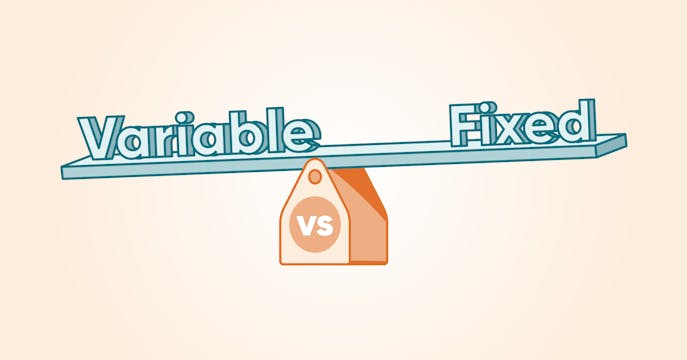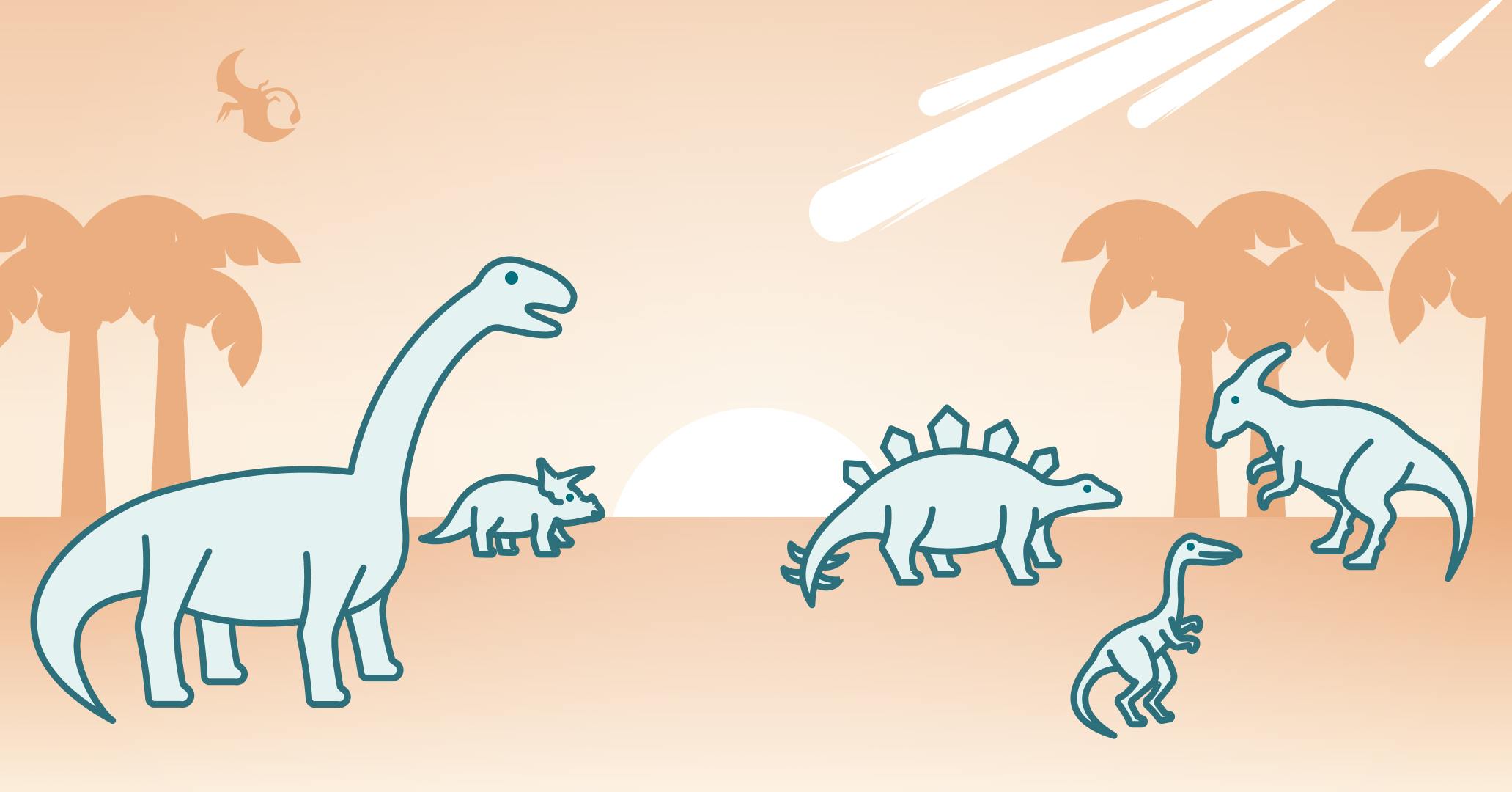Will rates this low soon be going extinct?
Rates are at all-time lows. How much longer can they last?
Grappling with pandemic fallout, whispers about rising interest rates are starting to sound like a roar. Variable or fixed - it might be time to think about preserving your lower mortgage rate, before they go the way of the dinosaur.
Let's take a moment to appreciate our current lower rates.
Posted October 18, 2021
Update October 25: This blog is based on a 5-year fixed rate of 1.99%, our current rate at the time of writing. Fixed rates have gone up again, as bond yields continue to climb. Check our current rates here.
Variable rates are at historic lows. And fixed mortgage rates, despite a recent increase by lenders, are still lower than they were at the beginning of 2020 (our lowest advertised rates were roughly at 2.65% then, versus 1.99% now). More and more experts are starting to say it out loud — these rates won't be here forever. High house prices, inventory challenges and flaring inflation are endangering Canada's current rock-bottom rate environment.
During the past months, many Canadians have been appreciating the lower mortgage costs — whether it's first-time buyers, renewals or refinances, or buying rental or vacation properties. And, these lower rates (ours are the best) have enabled Canadians to build their home equity faster than ever.
But as the sounds of coming rate-increases get louder, now may be the time to consider your future mortgage needs.
Right now, should you choose a variable or fixed rate?
What would a rate increase mean for you?
Let's take a look at some numbers, assuming a $350,000 mortgage over a 25 year amortization:
Variable-Rate Mortgages: Take our lowest advertised 5-year variable rate — right now it's at 1.09%. If that rate increases by 50 basis points to 1.59%, you would save about $8,000 over 5 years with our current rate of 1.09%. This example is simplistic; you'll still need to qualify for your best rate, and your interest and principal payments during your variable term will fluctuate with movements in the prime lending rate. But it gives you an idea of the savings difference if variable rates go up. The sooner you get a mortgage before variable rates start to increase, the more ahead you may still be by the end of your term.
Fixed-Rate Mortgages: Our lowest advertised 5-year fixed rate right now sits at 1.99%. If we compare this rate to the average fixed rate of 2.65% back in January of 2020 (a difference of +0.66), you would save about $10,800 over 5 years with our current rate of 1.99%. With a fixed rate, you'll be assured it won't go up during your term, and your payments will remain the same. Again, you'll still need to qualify for your rate, but locking into lower rates now may help you save more.
Want to see more numbers? Take a spin with our Compare & Save Calculator below, and then connect with our expert True North Mortgage brokers. They'll happily provide the rate-answers you need to make the right mortgage decision for your situation — with 5-star service along the way.
Does it make sense to break your term now to take advantage of these lower rates?
If you're currently paying more than our lowest-advertised 1.09% for your 5-year variable rate, talk to us — it may make sense to switch (depending on qualification). Even though a variable mortgage switch may incur pre-payment penalties, you may still come out ahead to save more.
There could be other scenarios that may make sense for you. For example, locking into a fixed rate from a variable rate, if you're concerned about where variable rates may be headed in the future.
For those of you with a higher fixed mortgage rate, more pre-payment penalties may apply for you to switch to a lower rate. But if you feel that you're paying too-high of a rate, and want to look at switching to these lower fixed rates now, give us a shout and we'll run the numbers for you to help you decide.
Where will rates go from here? Well, that's the $10,000 question.
All signs point to rates going up sooner rather than later. In fact, fixed rates have already started the upward trend, as we watch bond yields rise in response to government stimulus pullback.
Update October 27: The Bank of Canada is considering hiking its trend setting rates earlier than previously announced, saying it may start in the middle quarters of 2022.
How much and how fast rates may rise is tied to a number of key factors, such as rising inflation, supply and labour crunches, and housing competition in our toasty Canadian market.
As we saw above, a difference in rates for our popular 5-year fixed rate mortgage could save you around $10,000. But trying to firmly and confidently predict where rates will go is like trying to ask a crystal ball to cough up the goods.
Hold your best rates now, before they go up.
Connect with us online, through our chat, over the phone, or at a store location, and we'll hold your best rate now for up to 120 days. Whether you prefer a variable or a fixed mortgage rate, you'll get up to 4 months of peace-of-mind, while you look for a house or contemplate your mortgage-term future.
Is your mortgage coming up for renewal? Our expert, friendly True North Mortgage brokers can outline your best scenarios to lock in at these lower rates. Click here to get a helpful renewal reminder, so that you can go about your busy life until it's time to save, with us.
Where will rates be in 2 years, or 5? Take a spin with our Compare and Save Calculator below, to see how much more you can save with your lower True North Mortgage rate today.
Compare Rates and Save
Various tools and functions of this website perform calculations and provide cost estimates. These tools are designed for illustrative purposes only and make many assumptions that may not reflect all situations. Please use these tools in collaboration with a True North Mortgage agent. True North Mortgage does not guarantee the accuracy, reliability or completeness of these tools or calculations.
Give us a shout, for a rate that makes sense for you.
Our highly-trained brokers know a thing or two about mortgages and getting your very best rate (for which you need to qualify through the federal stress test). Our volume discount can make a difference, along with your better mortgage fit, to help you save a pile of cash.
It's easy to apply, and get your best rate.
Anywhere you are in Canada, online, over the phone or drop by a store location.
More about our better rates

Proof that our rates are lower.
Our rates are 0.18% lower on average compared to everyone else. Prove it? Okay!
Learn More
Should you choose a variable rate in 2025?
How to decide between variable-rate FOMO or JOMO? We can help.
Learn More
True North Mortgage is CMP's Top Brokerage of 2021
Helping Canadians get a better mortgage is our top priority.
Learn More

